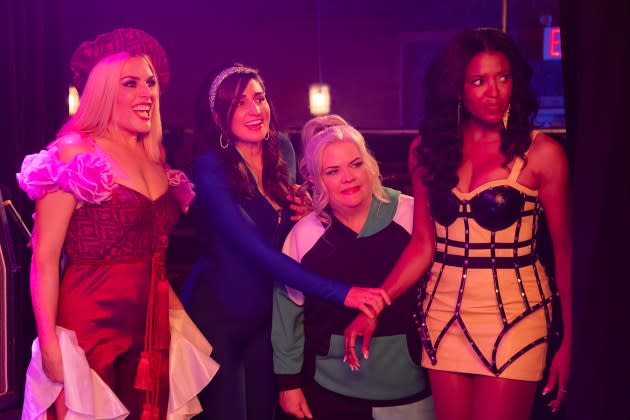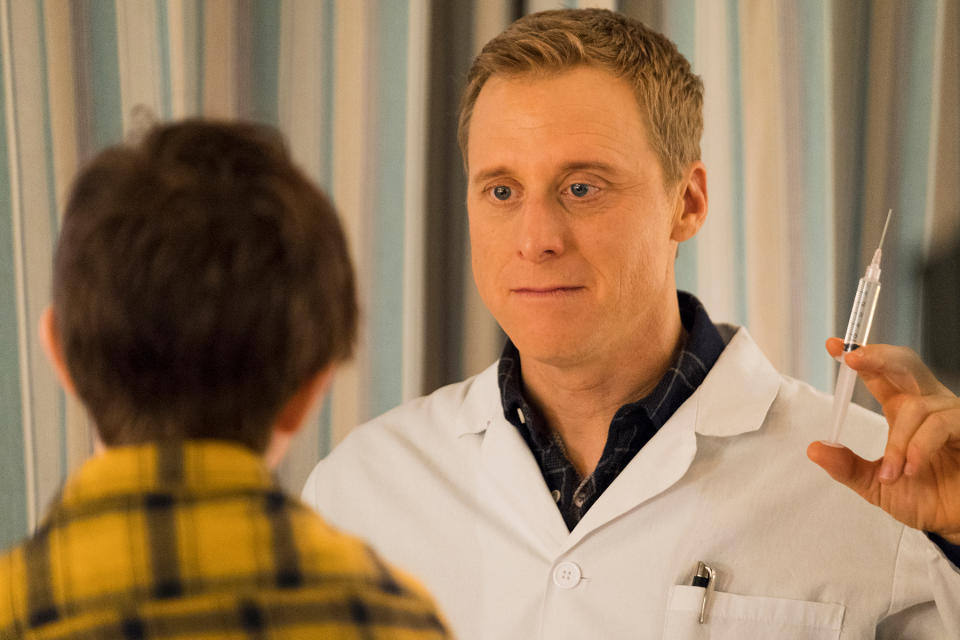How the ‘Netflix Effect’ Saved ‘Girls5eva,’ ‘The Tourist’ and Other TV Orphans
- Oops!Something went wrong.Please try again later.

Starting today, three seasons of Girls5eva — the Tina Fey-produced comedy starring Sara Bareilles, Renée Elise Goldsberry, Busy Philipps, and Paula Pell as members of a one-hit wonder pop group struggling to mount a comeback in middle age — are streaming on Netflix. The average subscriber will be forgiven for assuming the show, is, and always was, a Netflix original they just never noticed before, especially since the third season features a couple of meta jokes about being on the streaming giant. (The parents of Goldsberry’s Wickie, for instance, like to binge shows on Streamberry, the fake Netflix analogue introduced in the most recent Black Mirror season.)
But in fact, the first two Girls5eva seasons originally debuted on Peacock, catching the notice of few people other than TV critics who gravitate to any show created by Fey or one of her longtime collaborators (in this case, Meredith Scardino). Peacock couldn’t find an audience for the comedy — or any of its sitcoms, for that matter, the rest of which have been canceled — and corporate parent NBC Universal allowed Netflix to become the home of both the pre-existing homes and any future ones. It’s an arrangement that worked well for both companies in the past with Fey’s Unbreakable Kimmy Schmidt, which aired for four seasons on Netflix, but was originally produced to air on NBC until that network’s executives panicked that it would be too dark and weird to succeed.
More from Rolling Stone
Busy Philipps Took Over Social Media. Now She's Taking Over Netflix
Jennifer Lopez Must Save Mankind in Teaser for Sci-Fi Flick 'Atlas'
But even beyond this specific Fey/Netflix pipeline, Girls5eva represents one of the more inescapable TV trends of recent years: the Netflix Effect, where once a show gets associated with the streaming giant, it seems as if it has always been there.
There are typically three variations on the Netflix Effect:
In the first, a low-rated series like Girls5eva gets canceled by another outlet, and new seasons are made directly for Netflix, usually to greater success than at their original homes. It might surprise you to learn, for instance, that the first two seasons of Cobra Kai were actually made as part of YouTube’s failed attempt to get into the scripted TV business.

This variation happened as recently as last month with The Tourist, a BBC thriller series starring Jamie Dornan as a amnesiac man who wakes up in the Australian Outback to find that people keep trying to kill him, all as a reaction to terrible deeds he no longer remembers committing. Its first season premiered in 2022, on what was then called HBO Max, to little fanfare. But when the show moved to Netflix in February, along with a second season where Dornan’s Elliot and his ex-cop girlfriend Helen (Danielle Macdonald) get into another big mess in his native Ireland, it suddenly seemed to be a hit, making regular appearances in the Netflix daily Top 10(*).
(*) Obviously, take every reference to commercial success here with a grain of salt, since Netflix never releases completely clear and explicit ratings data. Even the Top 10 only means so much, since the Michelle Yeoh drama The Brothers Sun spent several weeks on that list earlier this year, only to get canceled after a single season. But these kinds of shows are obviously doing well enough that Netflix keeps acquiring them. And Cobra Kai has a sixth and final season in the works, an eternity for a streamer that of late seems reluctant to let its own shows run for more than a couple of years, if that.
In the second type of Netflix Effect — one that’s been happening pretty much since Netflix evolved from a mail-order DVD rental company into a streaming service — a low-rated series is canceled by another outlet, and while Netflix does not produce additional seasons, it seemingly becomes much more popular once it begins streaming there. Would Starz have ordered a Party Down revival season, or would Peacock be making a Community reunion movie, if those cult comedies hadn’t done better in their streaming afterlife on Netflix than they ever did during their original runs? Would NBC be producing a Suits spin-off (kind of, as it features no characters from the original, and seemingly no other connection) if the USA drama hadn’t improbably become the hottest show of last summer once its episodes began appear on Netflix, in addition to Peacock?
And in the third variation, an ongoing show that is airing elsewhere sells Netflix the streaming rights to its previous seasons, then explodes in popularity — sometimes just on Netflix, but sometimes with the new seasons benefiting. The most famous examples of this are Breaking Bad, which went from a low-rated critics darling on AMC into a monster hit in its final season because people had binged the earlier years on Netflix; and Schitt’s Creek, the Canadian family sitcom that was barely noticed at first in America on Pop, then found a big enough, and fervent enough, audience on Netflix that its final season made Emmy history as the first show to sweep every award in its category during the primetime telecast. For much of the last decade, the CW network existed largely to to sell shows like Arrow, Riverdale, and All-American to Netflix, many of them becoming beloved by younger viewers who have no idea what a broadcast network even is. And the NBC crime dramedy Good Girls made it to four seasons less because of its Nielsen ratings than because each season was doing well on Netflix after it originally aired.

Over the last month, the Netflix Top 10 has frequently featured another of these: Resident Alien, a comedy starring Alan Tudyk as an extraterrestrial invader posing as a human doctor in a small Colorado town. Its first two seasons dropped on Netflix right as the third season was debuting on the Syfy cable channel (and streaming on Peacock), and the volume of discourse around the show feels vastly louder than it ever did prior to mid-February.
Obviously, this doesn’t always work out for Netflix. The Kiefer Sutherland political thriller Designated Survivor ran for two seasons on ABC(*), and only one on Netflix, and plenty of series have had their reruns wind up on the streamer without anything close to the Schitt’s Creek or Suits bumps.
(*) There are also the rare occasions where things go in the other direction. When Netflix canceled the great One Day at a Time remake after three seasons, a fourth was made for Schitt’s Creek‘s old home Pop. And the second and third seasons of Tuca & Bertie wound up on Adult Swim after Netflix lost interest in the animated comedy from the BoJack Horseman team.
For the rest of the TV business, the Netflix Effect can be either frustrating or rewarding. If you’re an executive who worked for the now-defunct Yahoo Screen or YouTube Premium, it must have been maddening to see, respectively, Community and Cobra Kai do so much better on Netflix than they did for you. But plenty of work would have never gotten attention without the streamer; the people who worked on Party Down essentially never met anyone who had heard of the show until it wound up on Netflix in the early 2010s.
And even as a TV pedant who gets annoyed when someone refers to Better Call Saul as a Netflix show, I have to admit to being as susceptible to the Netflix Effect as everyone else. I watched the first couple of episodes of the first seasons of both The Tourist and Resident Alien prior to their premieres, found them interesting, and then for various reasons never got back to them until this last month, when they were both much more prominent in the cultural conversation and slightly easier to watch.
The Tourist is a high-concept show that seemingly shouldn’t work for more than a season, but relocating the action from the relentlessly browns of the Outback to the lush greens of the Irish countryside did wonders to keep the story feeling fresh, as did exploring Elliot’s family and spending more time with him and Helen as a couple. My only real complaint was the subplot where a character spent a couple of episodes locked in a dungeon, but even that felt something of a piece with the rest of a show that does well balancing life-and-death action with quirky comedy.
I’m still on Resident Alien Season Two, meanwhile, and continuing to find it a terrific showcase for Tudyk, who plays his role as equal parts alien and petulant child. Like Dexter and a lot of other cable shows, it’s often less exciting when the star’s off-screen, but he’s so good, and works so well with co-stars like Sara Tomko, that I’ve learned to accept some of the more blatantly time-killing subplots about the supporting cast.
Heck, the Netflix Effect even got me back into Girls5eva, where I originally skipped the second season because I found it exhausting after a while to keep up with its quadruple-layered punchlines. In this case, absence made the heart grow fonder, and I laughed a lot at the performances in the new episodes, and at random references like Wickie explaining that one of her old singles was released before she finished writing it because, “The label wanted it to be out in time to be playing in the background of a Breckin Meyer sex tape.”
The shadow that Netflix casts over the rest of the business can feel frustrating, especially since the streamer has generally gone for quantity over quality with its own originals, and often cuts them off before their stories are finished. (GLOW says hi.) But the Netflix Effect is hard to ignore, and often easy to appreciate when it brings more attention, love, and at times life, to shows that didn’t get enough when they originally ran somewhere else. And if Netflix wanted to order a fourth season of the martial arts epic Warrior (which is seemingly performing better there than when it was on either Cinemax or Max), I would not complain.
Best of Rolling Stone

